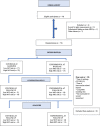Resistance training's impact on blood biomarkers and cognitive function in older adults with low and high risk of mild cognitive impairment: a randomized controlled trial
- PMID: 38600451
- PMCID: PMC11005144
- DOI: 10.1186/s11556-024-00344-9
Resistance training's impact on blood biomarkers and cognitive function in older adults with low and high risk of mild cognitive impairment: a randomized controlled trial
Abstract
Background: The aging brain exhibits a neuroinflammatory state, driven partly by peripheral pro-inflammatory stimuli, that accelerates cognitive deterioration. A growing body of evidence clearly indicates that physical exercise partly alleviates neuroinflammation and positively affects the aging process and cognition. In this randomized controlled trial, we aimed to observe the effect of 12 weeks of resistance training (RT) on peripheral biomarker levels, cognitive function changes and their interrelationship, and explore differences in those exercise-induced changes in older adults with high risk of mild cognitive impairment (MCI) compared to older adults with low risk of MCI.
Methods: Fifty-two participants (aged 60-85 years old, 28 female) were randomly allocated to a 12 week lower limb RT program consisting of two training sessions per week or waiting list control group. The Montreal Cognitive Assessment (MoCA) was used to stratify participants screened as high (< 26/30) or low risk (≥ 26/30) of MCI. We assessed serum Interleukin 6 (IL-6), Insulin-like Growth Factor-1 (IGF-1), and Kynurenine (KYN) levels. Cognitive measurement consisted of and four subtests of Automated Neuropsychological Assessment Metrics (ANAM), the two-choice reaction time, go/no-go, mathematical processing, and memory search test.
Results: Twelve weeks of RT improved Go/No-go test results in older adults with high MCI risk. RT did not significantly affect blood biomarkers. However, IGF-1 level increases were associated with improvements in response time on the mathematical processing test in the exercise group, and IL-6 level increases were associated with improvements in response time on the memory search test in the total group of participants. Finally, KYN levels significantly differed between older adults with low and high MCI risk but no significant associations with performance were found.
Conclusion: Our study results suggest a different effect of RT on inhibitory control between older adults with low compared to high MCI risk. IGF-1 may play a role in the mechanism behind the cognitive benefit of RT and KYN may be a surrogate biomarker for neurodegeneration and cognitive decline.
Keywords: Aging; Cognition; Exercise; Inflammation; Mild cognitive impairment; Myokine; Neurotrophic factor; RCT; Resistance training.
© 2024. The Author(s).
Conflict of interest statement
The authors declare that they have no competing interests.
Figures



Similar articles
-
Resistance exercise effects on hippocampus subfield volumes and biomarkers of neuroplasticity and neuroinflammation in older adults with low and high risk of mild cognitive impairment: a randomized controlled trial.Geroscience. 2024 Aug;46(4):3971-3991. doi: 10.1007/s11357-024-01110-6. Epub 2024 Mar 13. Geroscience. 2024. PMID: 38478179 Free PMC article. Clinical Trial.
-
A Study on the Effect of Traditional Chinese Exercise Combined With Rhythm Training on the Intervention of Older Adults With Mild Cognitive Impairment.Am J Alzheimers Dis Other Demen. 2023 Jan-Dec;38:15333175231190626. doi: 10.1177/15333175231190626. Am J Alzheimers Dis Other Demen. 2023. PMID: 37489602 Free PMC article. Clinical Trial.
-
Reshaping the path of mild cognitive impairment by refining exercise prescription: a study protocol of a randomized controlled trial to understand the "what," "for whom," and "how" of exercise to promote cognitive function.Trials. 2022 Sep 9;23(1):766. doi: 10.1186/s13063-022-06699-7. Trials. 2022. PMID: 36085237 Free PMC article.
-
Screening for Cognitive Impairment in Older Adults: An Evidence Update for the U.S. Preventive Services Task Force [Internet].Rockville (MD): Agency for Healthcare Research and Quality (US); 2013 Nov. Report No.: 14-05198-EF-1. Rockville (MD): Agency for Healthcare Research and Quality (US); 2013 Nov. Report No.: 14-05198-EF-1. PMID: 24354019 Free Books & Documents. Review.
-
Screening for Cognitive Impairment in Older Adults: An Evidence Update for the U.S. Preventive Services Task Force [Internet].Rockville (MD): Agency for Healthcare Research and Quality (US); 2020 Feb. Report No.: 19-05257-EF-1. Rockville (MD): Agency for Healthcare Research and Quality (US); 2020 Feb. Report No.: 19-05257-EF-1. PMID: 32129963 Free Books & Documents. Review.
Cited by
-
Hematological Malignancies in Older Patients: Focus on the Potential Role of a Geriatric Assessment Management.Diagnostics (Basel). 2024 Jun 29;14(13):1390. doi: 10.3390/diagnostics14131390. Diagnostics (Basel). 2024. PMID: 39001280 Free PMC article. Review.
-
Resistance Exercise Training as a New Trend in Alzheimer's Disease Research: From Molecular Mechanisms to Prevention.Int J Mol Sci. 2024 Jun 27;25(13):7084. doi: 10.3390/ijms25137084. Int J Mol Sci. 2024. PMID: 39000191 Free PMC article. Review.
References
Grants and funding
LinkOut - more resources
Full Text Sources
Miscellaneous

